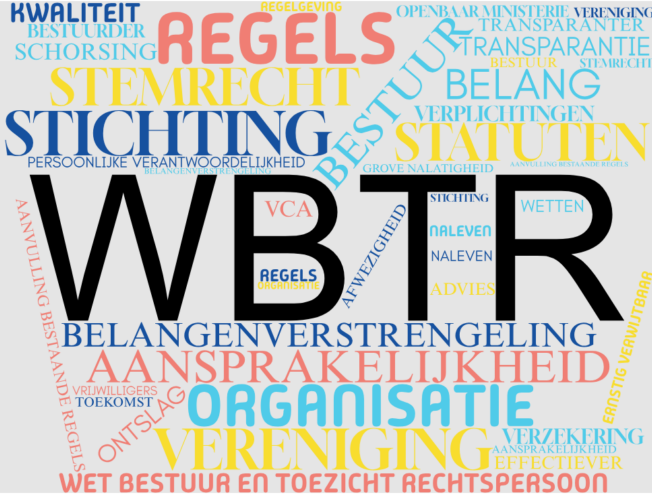About the WBTR – What you need to know as a director

There are all sorts of rumors circulating about the WBTR (Dutch Corporate Governance and Supervision Act). Some people think that as a director, you can get into personal debt or even go bankrupt due to a bad decision. But is that actually true? In this article, we’ll summarize the most important facts about the WBTR, so that as a director, you clearly understand what the law means and what the consequences may be.
What is the WBTR?
The WBTR (Dutch Act on the Management and Supervision of Legal Entities) amends and supplements existing regulations for associations and foundations. The law describes the requirements for directors and managers. The WBTR applies to every formal foundation or association, large or small, simple or complex. The purpose of the law is to prevent mismanagement, fraud, embezzlement, and criminal activity.
The main points of the WBTR in a nutshell:
- The organization’s interests always come first. As a board member, you must always act in the best interests of the foundation or association, not in your own. You could compare it to a steward who takes good care of other people’s property.
- What to do in the absence of a director? The articles of association of the association or foundation must clearly state what happens if a director is unavailable for a single period (inability to attend), temporarily, or for an extended period (absence). Who is authorized to make decisions in such cases, and how long can this situation last?
- Avoid conflicts of interest. If a director has a direct or indirect personal interest in a decision, they may not participate in the decision.
- Voting rights. The articles of association may stipulate that certain directors have more than one vote. However, no one director may cast more votes than all other directors combined.
- Directors’ liability. As a director, you are liable for your actions. This means you can be held personally responsible, but only if you acted in a seriously culpable manner. For example, in the case of gross negligence or improper management.
- Dismissal or suspension of directors. The court can dismiss or suspend a director in cases of serious mismanagement. This can happen, for example, at the request of the Public Prosecution Service.
When can you be held liable as a director?
In most cases, the foundation or association itself is responsible for the damage, not the director personally. Note: the articles of association of the foundation or association must be notarized and submitted to the Chamber of Commerce. If you, as a director, make serious mistakes, you can be held liable. This can happen, for example, if you:
- Does not comply with the articles of association,
- Entering into obligations you cannot meet (such as tax payments),
- Intentionally harms creditors (for example in bankruptcy),
- Or if you commit fraud.
If you, as a board member, act responsibly and comply with the rules, there is very little chance of being held personally liable. This is also evident from legal cases following the introduction of the WBTR. For example, at a tennis club, the board paid 95% of the amount to a contractor, even though that contractor went bankrupt. The board was not held liable.
What does this mean for you as a director?
If, as a director, you prioritize the organization’s interests, work transparently, have clear and up-to-date statutes, and do not allow personal interests to influence decision-making, there is little chance of problems.
Should you, as a director, be held liable, you can often take out insurance, such as the Amsterdam Volunteer Insurance, which covers director liability under certain conditions.
Improve quality
View the WBTR as an opportunity to improve the quality of governance, both for current and future board members. By familiarizing yourself with the law, you can ensure your board operates more effectively and transparently. The advisors at Vrijwilligers Centrale Amsterdam are happy to assist you.
Sources
General: Civil Code, Book 2 Legal entities: Association (Article 37 et seq.) and Foundation (Article 285 et seq.)
About the WBTR amendment: https://zoek.officielebekendmakingen.nl/stb-2020-507.pdf
Example of a court ruling on liability: ECLI:NL:RBOVE:2024:5517 Overijssel District Court, 23-10-2024, C/08/308094 / HA ZA 24-4
On legal aspects: https://nocnsf.nl/handboek-wet-en-regelgeving/3-aansprakelijkheid-van-het-bestuur-van-de-vereniging







